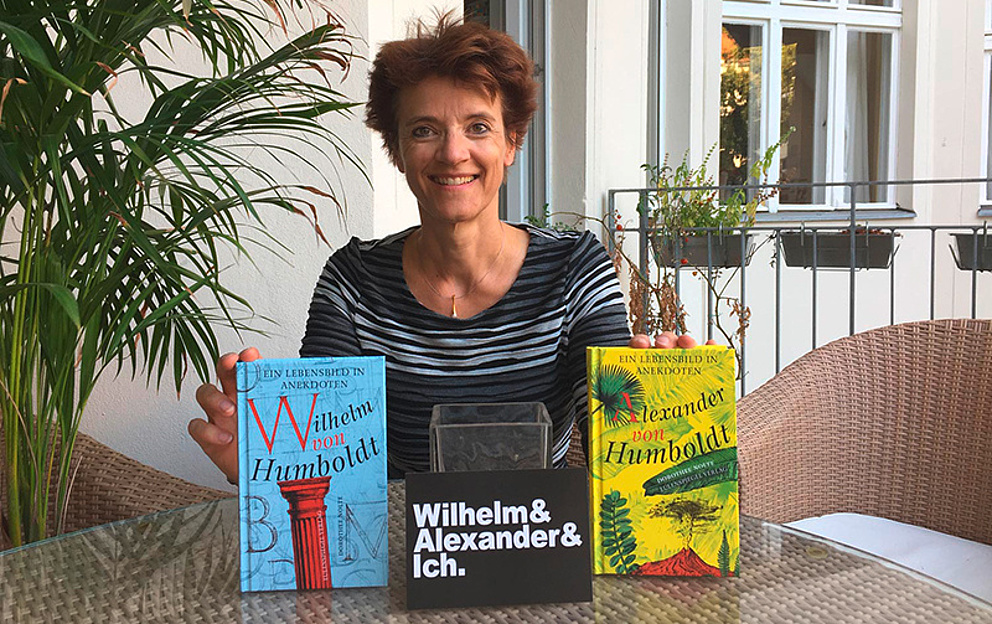Jump to the content
- {{#headlines}}
- {{title}} {{/headlines}}

Dorothee Nolte (PhD in Literature) is editor of the Politics and Philosophy section in the Berliner Tagesspiegel.
Dorothee Nolte, your new book Alexander von Humboldt - Ein Lebensbild in Anekdoten (Alexander von Humboldt: A Life Told in Anecdotes) is essentially a biography made up of anecdotes that you have come across in the course of your research. Why have you chosen this format?
DOROTHEE NOLTE: I’m not a scientist, so I went about my research differently from the way a scientist might have approached the subject. I was looking for witty quotes and amusing happenings which I then brought to the surface like a pearl fisher. There have already been a large number of publications and biographies about Alexander. But there was a special focus to my enquiries – I was looking for strong narrative, entertaining stories that reflect Humboldt’s most pressing concerns, but in a condensed form.
Which sources did you access apart from letters and biographies?
At the Berlin-Brandenburg Academy of Sciences and Humanities, there is a research centre focusing on Humboldt. The former director, Ingo Schwarz, has been very supportive. Among other things, he pointed me in the direction of Gespräche Alexander von Humboldts (The Conversations of Alexander von Humboldt), a collection which went out of publication some time ago. The book contains a wealth of Humboldt’s quotations and pronouncements recorded at the time – a veritable treasure trove.
Contemporary witnesses are not always favourably inclined towards Alexander von Humboldt. Should we think of him as an outrageous slanderer?
At least, reports of that kind have been handed down. It has been alleged that guests would not leave a social gathering before Humboldt left, because he would speak ill of the absent. But I find this small character foible forgivable, because he was also able to laugh at himself.
How well do you think it is possible to know him as a private person? For example, in the matter of love. He is supposed to have had homosexual inclinations, but whether he indulged them is unknown. There aren’t any stories about romantic liaisons with females, though, are there?
There is the telling anecdote about a certain Fräulein von R who tried to attract his interest, not least because he was also a good-looking man. She sought to engage him in conversation about his measuring instruments, a good choice of topic with Humboldt [Dorothee Nolte laughs], and at some point, she enquired whether he had ever been in love. To which he is said to have replied: “Yes, but only with science.”
The image that we have of Alexander is also that of the fearless adventurer – never seasick, always the first to scale the volcano. Was he something of a self-publicist?
His curiosity, his thirst for knowledge was really extraordinary. Humboldt had this ruthlessness towards himself which bordered on mania. He did not even shy away from being the guinea pig in his own experiments. During his spell as a mining engineer, for example, he designed a lamp that was supposed to work efficiently in low-oxygen environments. To test it, he was quite willing to take the risk of falling unconscious.
Might he be described as a sort of pop star of his time? His lectures were attended by audiences of a thousand or more, and he was deluged with correspondence from admirers.
Absolutely. It also has to be mentioned that he was a gifted networker. If Alexander were to be brought into our era, I am convinced that he would have no problem fitting in. And he would certainly make effective use of modern media.
How did he handle his own fame?
He knew how to downplay his celebrity status. A prince once asked him what he was by profession. To which Humboldt replied: “King’s Chamberlain.” Whereupon the prince wrinkled his nose and said: “Is that all?” But for Humboldt, this was not a slight but rather evidence of the prince’s intelligence, as he himself did not consider the role of Chamberlain to be anything special. He maintained a healthy distance to “superfluous pomp”.
Humboldt’s liberal views were ahead of their time. To what extent did he rub those around him up the wrong way?
There is the interesting quote from a contemporary who mocked Humboldt for being “the eternal republican who was always in the palace anteroom”. He was a smooth operator, but he nevertheless made himself unpopular with the conservative faction around the king. This “reactionary cloud”, as Humboldt called them, considered him a “trikolorer Lappen” (a reference to the Tricolore flag of the French Revolution).
He spoke disparagingly about the “moral desert” of Berlin for most of his life. It was only in old age that he moderated his tone. A credible conversion?
Berlin was obviously not as cosmopolitan as Paris. But Humboldt had his brother’s family here, he was popular with the people and he was nominated honorary citizen of Berlin. I think that he broadly came to terms with the city. Nevertheless, he was profoundly opposed to certain phenomena such as the prevailing anti-Semitism. And the natural surroundings seemed very boring to him. The only place he could be with his beloved tropical vegetation was a palm house on Pfaueninsel, an island in the Havel river.
Bismarck described Alexander von Humboldt as a “merciless babbler”. Just how tolerable a companion was he, when all is said and done?
Bismarck was also a great gossip; the two were certainly each other’s equal in that regard! However, even Wilhelm sometimes complained about his brother engaging in monologues. And I too am more a fan of dialogue. On the other hand, it’s possible to enjoy the company of people who know such a lot, have travelled so extensively and researched and written so much, even if they have the odd character failing.


